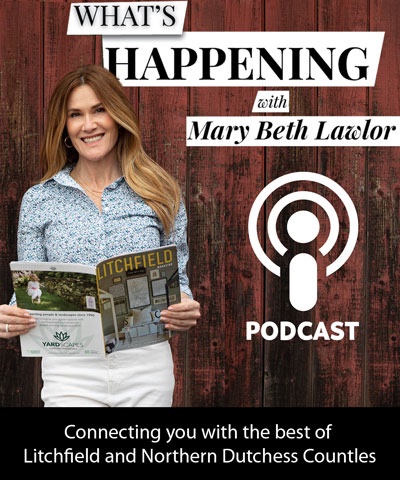June 1, 2013
Litchfield Hills Aikikai is a traditional Japanese martial arts school
teaching Aikido—a peaceful, spiritual way to find balance in your life.
On the morning of May 4th, the third floor of the old switch building in Bantam was brimming with more than 70 participants during a seminar with a guest instructor. The windows were open and a slight breeze nudged the wind chimes in this beautiful, sunlit open space. Apart from the gentle music of the chimes, the only sound was a soft thumping as people dressed in their white gis practiced the movements of Aikido together, in silence. It was an
amazing scene to witness.
They were celebrating the 20th anniversary of the formation of Litchfield Hills Akikai, which was founded by Laura Pavlick, owner and chief instructor. The special guest instructor that day was Yoshimitsu Yamada Shihan (master), head of the New York Aikikai (NYA). Yamada Sensei is one of the most important and influential Aikido instructors in the world today. He is one of the remaining original disciples of Morihei Ueshiba (O-Sensei), the founder of Aikido, who developed it in the early 1900s.
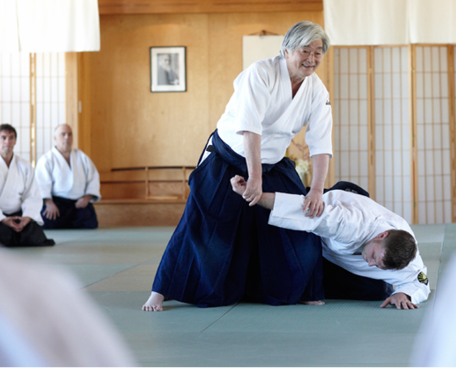
According to the United States Aikido Federation, Aikido strives for the ultimate goal of peaceful resolution rather than defeat. Composed of three Japanese characters: Ai, meaning harmony; Ki, spirit or energy; and Do, the path or the way, the word Aikido thus signifies the “Way of Unifying Life Energy.” The preservation of one’s attacker is as important as one’s own self defense.
The Aikidoist trains to apply various wristlocks, arm pins or unbalancing throws to subdue and neutralize attackers without serious injury. Such practice is done in tandem with learning the art of falling, or ukemi, which trains the body and mind to receive such techniques in a safe manner.
Uke is the attacker, also known as the receiver of the technique. The role of the attacker or partner is to offer you themselves for you to practice. You take turns. Uke is responsible to give themselves to the attack, to fall, and to follow. Nage is the defender or the giver of the technique. Nage does the technique well, so they don’t hurt themselves and they protect the attacker. With Aikido, it’s never not your turn. The goal is to create one body—instead of two opposing bodies. It’s about balance.
Aikido is not a sport and hence there are no competitive tournaments. Rather, by cooperative training, the Aikidoist betters oneself without belittling others, without the intention of harm or fear of injury. As traditional Japanese budo, Aikido maintains the qualities of martial spirit, effective technique and intense training. This, coupled with the premise of mutual respect and caring, and the important balance between attacker and defender, encourages the spirit of O-Sensei’s desire for universal peace.
More than just the study of physical techniques, Aikido emphasizes proper etiquette, attitude and behavior. The basic movements of Aikido are circular in nature. The Aikidoist trains to harmonize with, rather than confront an aggressive line of force and converts it into a circular motion that renders attackers helpless. The circular movements are like dance, and the intent is to avoid conflict.
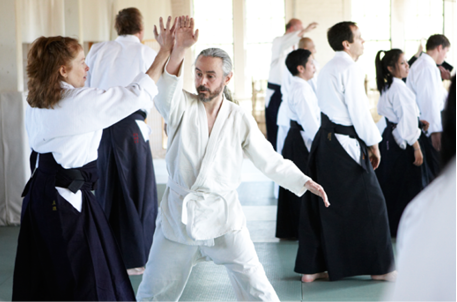
Aikido is about mind, body, and spirit. It reduces stress, it’s great for the spirit, and creates a sense of community. The environment is one of respect, a very Japanese value. Aikido cleans your mind and makes you feel positive. You learn to resolve conflict peacefully and to redirect negative energy. Physically, the full body is used. Flexibility, stamina, coordination, and grace are all benefits from practicing aikido.
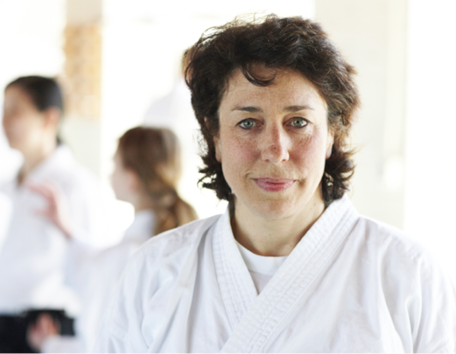
Thirty-two years ago, Laura Pavlick was attending NYU in the same New York neighborhood she grew up in and she walked into an Aikido dojo (a training place for martial arts). She saw a sea of animated, happy people working together and knew she wanted to be a part of it. She joined the dojo and spent the next 10 years there, practicing and learning. As a shodan (literally means “beginning degree,” a black belt rank in Japanese martial arts), she was assigned to teach a regularly scheduled class at the New York Aikikai, while also taking several classes daily. When she moved out of the city to Litchfield County, the hardest part of the move was leaving the dojo. So she started her own, and she raised her family at the same time. Even the day she gave birth to her child, she was at the dojo, teaching. At the time that she moved the dojo’s location to the current space in Bantam, she had only five students. She was committed to creating an Aikido community in Northwestern Connecticut, so she persevered. She didn’t see herself as a promoter but that was okay because it was in sync with the Aikido spirit of being humble. So she relied on word of mouth and eventually got some press about the dojo. Over time, the size of her classes grew. “Those who come here are people who have been looking for this their whole life,” she says.
In addition to Laura, there are three other instructors at the dojo. The student-teacher relationship is very important in Japan, and Laura is as proud of her students as she is of her teacher. She says, “With Aikido, you never stop learning. You never arrive.”
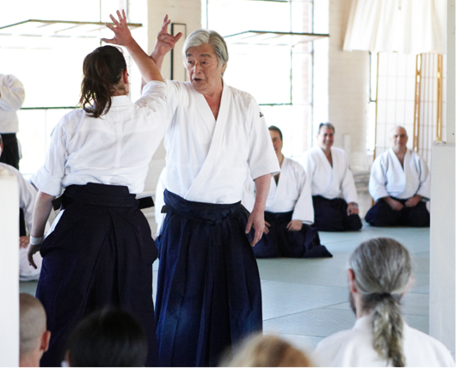
Laura Pavlick lives in Litchfield with her husband and two children. She has incorporated the Aikido community into her life beyond the mat by holding the position of director of operations for the United States Aikido Federation. She is the editor of the online newsletter USAF Aikido News, www.usafaikidonews.com, and serves as secretary to the board of directors of the USAF. The USAF is a national organization directly connected to the founding headquarters in Japan. The goal of the Federation is to maintain the traditional practice and integrity of the techniques of Aikido.
Aikido was created to practice self-defence in a harmonious manner. It’s non-competitive, and there is no separation. Some people have white belts and some have black belts, but there are no external markings of level (except with children). Everyone practices together, but it’s your own personal journey. There is a hierarchy of respect, inherent in the dojo, designated by time-span. And though there are no competitions, there are tests to mark your progress.
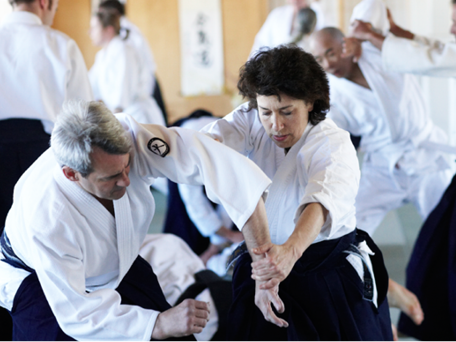
Aikido is unique. You never practice alone. Someone is always touching somebody. You work with different people, changing partners. There is a kind of trust and acceptance. Aikido is based on getting out of the way safely—never about colliding. If you become your partner’s shadow, you will win. Practice always has a peaceful outcome.
Age is not a concern in Aikido. You can begin at any age. Since it is not geared to fighting, the techniques are natural and you can modify your movements to suit your ability. It’s good for kids, teaching them discipline, etiquette, and respect (bowing to each other, changing partners). It’s also a great outlet for productive energy, focus, self-progression, self-defence, and it’s non-violent. In their daily lives, they don’t ever feel they have to fight because they know they can defend themselves.
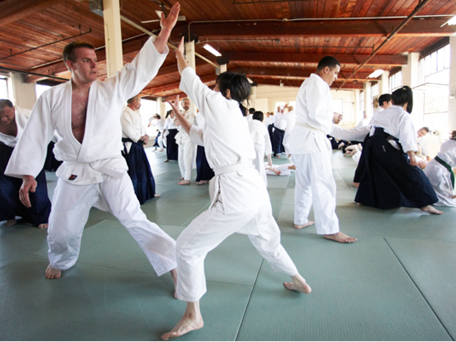
The Hunter Montessori School in New Hartford has been sending their students (ages 6 and up) to Litchfield Hills Aikido by bus for more than 10 years. Laura works with them—not just on movements—but also in teaching them the Aikido pilosophy through words and poetry. Often they will work on a technique, then write a haiku about the technique.
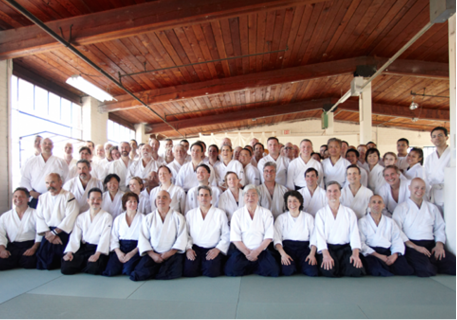
There are different reasons to attend the dojo. Some people go to get in shape, some go to do something for themselves, others because they want more flexibility. The common thread, whatever their original motivation was, is that they all end up loving the philosophy.
Sometimes there are 4 students in Laura’s class in Bantam and other times there are 20 mixed-level students. It varies week to week. But the dojo is never as full as that day in May, when the silence of 70 people practicing together was breathtaking. Laura says, “Have you ever seen so many people having so much fun?”
For information on Aikido and Pilates contact Laura Pavlick at 860.567.3555 or 860.567.2527.
Or visit the website: www.litchfieldaikido.com
Litchfield Hills Aikikai, 931 Bantam Road (Route 202), Bantam







